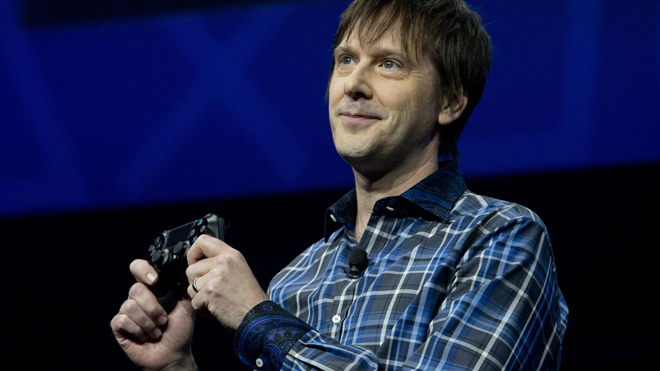This post has not been edited by the GamesBeat staff. Opinions by GamesBeat community writers do not necessarily reflect those of the staff.
Picture for a moment a stage in a full auditorium. There’s nothing on it but one microphone ready for its speaker as we wait in anticipation to listen. The lights dim, spotlights flick on, and out comes a man to tell you a story. He stands up straight, speaks clearly, and follows a classic formula of storytelling in a few acts. He’s enthusiastic and has you hanging on every word because he’s weaved his story together so tightly that you barely notice what he’s actually saying — only that he’s saying it very, very well.
He leaves, the applause dies, and then follows a second man. He looks exactly the same and is equally as enthusiastic At first, at least. He starts to tell a story, but there’s something in his eyes that tells the audience that he’s struggling to remember the words. This doubt makes him nervous. He begins to skip around, backtracks because he forgets something, and takes one too many drinks from his water, but he still finishes. He smiles and leaves to mild clapping.
Anyone in that audience knows who the better storyteller was, and in the world of business, selling the story isn’t so much about selling the story itself as it is selling the storyteller. The man who is up on stage and confident in himself shows enthusiasm and energy, and that’s who you’ll remember even if you forget the details of the story itself.

Above: Cerny comes from a long history of game development, making his presence more comforting and (seemingly) honest.
Confidence in the video game world is tough to come by. Considering the fickle nature of gamers as a whole — a group that can turn on you in a snap and now have the outlet of the Internet to make that turn even more egregious — you either have to pander to them to give them what they want or risk a firestorm that can easily turn wild. It’s a tough act to balance, a tougher story to tell. Gamers desire confidence by a company and assurance of their purchasing power. They’re giving money, so they want to make sure that what they’re spending isn’t going toward something that sputters out or wastes their time.
Fair enough. Call it entitlement or some weird societal egomaniacal creed put out by the gamer demographic, but it really comes down to consumer confidence.
It’s hard to separate the corporation from the marketing of a product. No matter how you cut it, Sony is a huge company, Microsoft is a huge company, and both are trying to balance that sense of confidence with a clear message to gamers and still make money in the long run. The Playstation 4 and Xbox One aren’t “gifts” to gamers despite what they might think. They’re business strategies that define the direction a company and how you’ll spend the contents of your wallet for the next decade. Gamers want something good and, on top of that, plenty of reasons why it is good.
I think it’s clear who has that voice and who does not. Mark Cerny recently stepped onto a stage in Barcelona and gave a presentation that sounded less like a mere PowerPoint and more like a conversation. His “story” is himself, and that parallels the story from Sony and its PlayStation 4. What surprised most people — because you see it so little when it comes to these huge companies — is the candor he expressed as a console architect and the “face” of Sony’s PlayStation 4. He’s “just a guy” who’s climbed the ladder of video game development for decades. He likes playing games and talks about the hills and valleys he found himself in. One such valley was that of the PlayStation 3, which created difficulties for developers and Sony itself. It was a lesson learned.
This was a rare occurrence. Often representatives of multibillion-dollar corporations aren’t candid. Everything is double speak and PR management down to every last detail because, God forbid, someone actually say something that might make him sound like a human being. As mentioned, it was less a “presentation” and more a “conversation,” and a clear visionary stepped forward — not through a rip-roaring speech or some dub-step-infused marketing presentation but through humbleness and acceptance of past faults.
Meanwhile, the face of Microsoft and the Xbox, past and future, is gone. Microsoft had been tripping over itself already, but most people thought Don Mattrick would be like Cerny and paint a clear picture of the Xbox One for consumers. Microsoft failed to express its vision early on and resorted to a collection of talking heads and press releases with no voice loud enough to help the consumer understand, much less have confidence in Microsoft or its product.
For me, it comes back to that humbleness of standing on a stage and speaking frankly. Everyone can point to Cerny and say, “That’s a guy I can get behind,” but there’s uncertainty on Microsoft’s side. As a gamer, I could care less. Both the PlayStation 4 and Xbox One are going to be great consoles with great games. As a consumer, though, I need some assurances that what I am buying is worth the price and won’t go belly up quicker than you can say “Dreamcast.”
Someone who lays it out there, warts and all, goes a long way with me, and a lot of other people today are tired of buzzwords and press releases. Maybe it’s all part of the Sony strategy — a company willing to admit its faults instead of grandstanding is welcome these days — but even if that were the case, it tells me that the team decided to be frank with consumers rather than pretend everything’s perfect.


